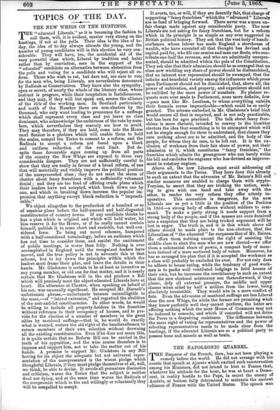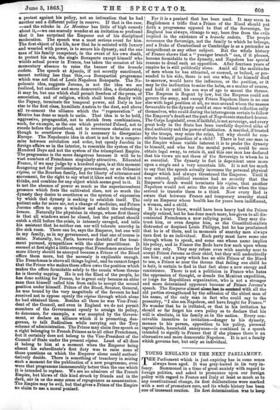THE NAPOLEONIC QUARREL.
THE Emperor of the French, then, has not been playing a comedy before the world. He did not arrange with his cousin that speech at Ajaccio which excited such consternation among his Ministers; did not intend to hint to France that, whatever his attitude for the hour, he was at heart a Demo- crat, in reality hostile to the Pope, in secret the enemy of Austria, at bottom fully determined to maintain the ancient alliance of France with the United States. The speech was a protest against his policy, not an intimation that he had another and a different policy in reserve. If that is the case, —and the rebuke in Le Moniteur has little of high comedy about it,—we can scarcely wonder at an irritation so profound that it has surprised the Emperor out of his disciplined moderation. The speech was a most serious event for him. The first object of his life, now that he is satiated with luxury and wearied with power, is to secure his dynasty, and the one man of his family competent, in the event of his own death, to protect his son, the single Bonaparte except himself who wields actual power in France, has taken the occasion of his momentary absence to raise the banner of the branche Cadette. The speech at Ajaccio, if not secretly sanctioned, meant nothing less than this,—a Bonapartist programme which was not that of Louis Napoleon Bonaparte. The Na- poleonic idea, suggests Jerome, is not the idea we see realized, but another and more democratic idea, a dictatorship it may be, but one which shall permit freedom of the press, of association, and of religion, which shall break finally with the Papacy, terminate the temporal power, aid Italy in her rise to the first class, humiliate Austria to the dust, and above all re-cement the alliance which the " regeneration" of Mexico has done so much to untie. That idea is to be bold, aggressive, propagandist, not to shrink from combinations, such, for example, as the one which protected Poland, not to recede before the priesthood, not to reverence obstacles even though to overthrow them it is necessary to disorganize Europe. The Napoleonic idea in short is not to be a compro- mise between revolution and order, but openly Jacobin in foreign affairs as in the interior, to resemble the system of the Hundred Days and not the system of the triumphant Empire. The programme is the more dangerous because it will be to vast numbers of Frenchmen singularly attractive. Educated France, if we may judge by a hundred signs, is at this moment hungering not for parliamentary government, or an Orleanist regime, or the Bourbon family, but for liberty of utterance and movement, for the right to say what it likes and write what it thinks, and combine for any object which seems good to it. It is not the absence of power so much as the superincumbent pressure which frets the cultivated class, not so much the dynasty they desire to overthrow as the system of expression by which that dynasty is seeking to establish itself. The patient asks for more air, not a change of medicine, and Prince Jerome offers to open a window and admit the refreshing breeze. Naturally the physician in charge, whose first theory is that all windows must be closed, lest the patient should catch a chill before the crisis, is intensely enraged, and tells his assistant that he neither can nor will tolerate anarchy in the sick room. There can be, says the Emperor, but one will in my family, as in my government, and that one of course is mine. Naturally, too, Paris, however doubtful of the treat- ment pursued, sympathizes with the elder practitioner. It seemed at first sight a little strange that Frenchmen anxious for more liberty should be annoyed because a Prince of the Blood offers them more, but the anomaly is explicable enough. The Frenchman is above all things logical, and he cannot forget that the Prince who makes these offers owes the position which makes the offers formidable solely to the cousin whose throne he is thereby sapping. He is not the Elect of the people, he has done nothing for France, he is great only because an abler man than himself called him from exile to accept the second position under himself. Prince of the Blood, Senator, General, he was bound by the very magnitude of the favours he had received not to oppose openly the regime through which alone he had obtained them. Besides all these he was Vice-Presi- dent of the Council, and even in England we do not permit members of the Government openly to arraign its policy, to denounce, for example, a war accepted by the Govern- ment, or declare an alliance which it is promoting, dan- gerous, to talk Radicalism while carrying out the Tory scheme of administration. The Prince may claim free speech as a right belonging to French Princes as to all other Frenchmen, but it certainly does not belong to the Vice-President of the Council of State under the present regime. Least of all does it belong to him at a moment when the Emperor being absent his subordinate's first duty was to raise none of those questions on which the Emperor alone could authori- tatively decide. There is something of treachery in seizing such a moment for the publication of a new programme, even were that programme immeasurably better than the one which it is intended to replace. We are no admirers of the French Empire, but blows of this kind struck by friends and in the dark, stir in us the same sense of repugnance as assassination. The Empire may be evil, but that gives a Prince of the Empire no claim to use a moral poniard. For it is a poniard that has been used. It may seem to Englishmen a trifle that a Prince of the Blood should put forth a programme opposed to that of the Sovereign, for England has always, strange to say, been free from the evils implied in the existence of a branche cadette. The people reverence the Sovereign, not the family to which he belongs, and a Duke of Cumberland or Cambridge is as a pretender as insignificant as any other subject. But the whole history of France shows that a " younger branch " can, if it pleases, become formidable to the dynasty, and Napoleon has special reasons to dread such an opposition. After fourteen years of empire he is still politically alone. Amid all the multitudes of men whom he has attracted, or coerced, or bribed, or per- suaded to his side, there is not one who, if he himself died to-morrow, would have the influence, or the position, or it may be the inclination to seize the helm, as a matter of course, and hold it until his son was of age to mount the throne. The Empress is Regent by law, but the Empress could not govern the army, and except Prince Napoleon there is no ono else with legal position at all, no man around whom the masses favourable to the dynasty could at once without reflection rally themselves, who could during the interregnum certain to follow the Emperor's death act the part of Napoleonic standard-bearer. The Corps Legislatif, even if faithful, is not sovereign, and every great body in the State has been carefully deprived alike of final authority and the power of initiation. A. marshal, if trusted by the troops, may seize the reins, but why should he con- stitute himself guardian of a child ? There is but one man in the Empire whose visible interest it is to prefer the dynasty to himself, and who has the mental power, could he once obtain legal sway, to retain it, and this one man has declared that his views are not those of the Sovereign to whom he is so essential. The dynasty in fact is dependent once more upon a single and a very uncertain life. It is not too much to say that the speech actually increases the personal physical danger which had always threatened the Emperor. Until it was uttered, political enemies had no security that the Emperor's death would terminate his regime, that another Napoleon would not seize the reins in order when the time arrived to transfer them to a third. Now every Red is aware that between France and temporary anarchy stand only an Emperor whose health has for years been indifferent, a woman, and a child.
It is a heavy blow, would have been heavy had the Prince simply retired, but he has done much more, has given to all dis- contented Frenchmen a new rallying point. They may dis- trust him, or even despise him, as the Constitutionalists distrusted or despised Louis Philippe, but he has proclaimed that he is of them, and in moments of anarchy men always turn first to an individual. Each party must have sonic one through whom to speak, and some one Whose name implies his policy, and in France the Reds have few such upon whom they can rely. They may refuse even with anarchy near to accept Prince Jerome as their chief, but they will undoubtedly use him ; and a party which has an able Prince of the Blood to use, a Prince so near the throne that failing one child he is heir, is certain to find in that fact alone a new energy and consistence. There is not a politician in France who hates the oppression of thought, or dreads the Mexican expedition, or longs for Republican organization, who is not a stronger and more determined opponent because of Prince Jerome's speech. The Emperor almost aloae.1*s to oontend with all the old parties strengthened by the adhesion of the ablest man of his name, of the only man in fact who could say to the peasantry, "I also am Napoleon, and have fought for France." No wonder that he is irritated, or that in his irritation he should so far forget his own policy as to declare that his will is absolute, in his family as in the nation. Every con- ceivable incentive to irritation—danger to his dynasty, menace to his person, opposition to his policy, personal ingratitude, household annoyance—is combined in a speech intended to signify to France that if she pleases there is an alternative and more democratic Napoleon. It is not a family which governs her, but only an individual.































 Previous page
Previous page